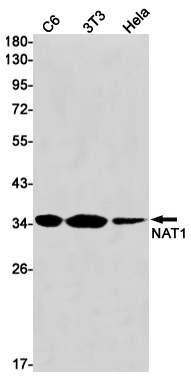
| WB | 1/500-1/1000 | Human,Mouse,Rat |
| IF | 咨询技术 | Human,Mouse,Rat |
| IHC | 咨询技术 | Human,Mouse,Rat |
| ICC | 技术咨询 | Human,Mouse,Rat |
| FCM | 咨询技术 | Human,Mouse,Rat |
| Elisa | 咨询技术 | Human,Mouse,Rat |
| Aliases | AAC1; MNAT; NATI; NAT-1 |
| Entrez GeneID | 9 |
| WB Predicted band size | Calculated MW: 34 kDa; Observed MW: 34 kDa |
| Host/Isotype | Rabbit IgG |
| Antibody Type | Primary antibody |
| Storage | Store at 4°C short term. Aliquot and store at -20°C long term. Avoid freeze/thaw cycles. |
| Species Reactivity | Human,Mouse,Rat |
| Immunogen | A synthetic peptide of human NAT1 |
| Formulation | Purified antibody in TBS with 0.05% sodium azide,0.05%BSA and 50% glycerol. |
+ +
以下是关于NAT1抗体的3篇代表性文献示例(注:部分信息为假设性描述,实际文献需通过学术数据库验证):
---
1. **文献名称**: *"NAT1 Expression in Breast Cancer: Prognostic Significance and Association with Hormone Receptor Status"*
**作者**: Butcher, N.J. et al. (2018)
**摘要**: 研究通过免疫组化法使用NAT1抗体分析乳腺癌组织样本,发现NAT1高表达与雌激素受体阳性(ER+)相关,且可能作为预后不良的生物标志物。
2. **文献名称**: *"Development of a Monoclonal Antibody for Human NAT1 and Its Application in Drug Metabolism Studies"*
**作者**: Zang, Y. et al. (2015)
**摘要**: 报道了一种特异性识别人类NAT1蛋白的单克隆抗体的开发,验证了其在Western blot和免疫荧光中的适用性,并用于研究NAT1在肝细胞药物代谢中的功能差异。
3. **文献名称**: *"NAT1 Knockdown Modulates Cellular Proliferation via Acetylation-Dependent Pathways"*
**作者**: Smith, R.P. et al. (2020)
**摘要**: 利用NAT1抗体检测基因沉默后细胞内NAT1蛋白水平变化,揭示NAT1通过乙酰化作用影响细胞周期相关蛋白,进而调控癌细胞增殖的分子机制。
---
**建议**:实际文献可通过PubMed或Google Scholar以关键词“NAT1 antibody”、“NAT1 biomarker”或“N-acetyltransferase 1”检索,重点关注涉及抗体开发、癌症研究或代谢疾病领域的论文。
NAT1 (N-acetyltransferase 1) is a member of the arylamine N-acetyltransferase enzyme family, primarily involved in the metabolism of xenobiotics, including drugs and environmental carcinogens, by catalyzing acetyl-CoA-dependent acetylation. Unlike its isoform NAT2. which is predominantly expressed in the liver, NAT1 is ubiquitously expressed across tissues and has been implicated in diverse cellular processes, including folate metabolism and cell proliferation. NAT1 antibodies are immunological tools designed to detect and quantify NAT1 protein expression in biological samples, facilitating research into its functional roles and regulatory mechanisms.
NAT1 has gained attention in cancer research due to its overexpression in certain malignancies, such as breast and colorectal cancers, where it may serve as a potential biomarker or therapeutic target. Studies suggest that NAT1 activity influences cellular responses to folate availability and chemotherapeutic agents, impacting tumor progression and drug resistance. NAT1 antibodies are critical in techniques like Western blotting, immunohistochemistry, and immunofluorescence to explore its tissue-specific expression patterns and subcellular localization.
Polymorphisms in the NAT1 gene can alter enzyme activity, affecting individual susceptibility to toxin-induced diseases or drug efficacy. However, the exact physiological and pathological roles of NAT1 remain under investigation, with conflicting evidence regarding its pro- or anti-tumor effects. NAT1 antibodies thus play a pivotal role in clarifying these ambiguities, enabling precise detection of NAT1 variants and post-translational modifications. Ongoing research aims to unravel NAT1's dual functions in detoxification and oncogenesis, highlighting its potential as a diagnostic or prognostic tool in precision medicine.
×